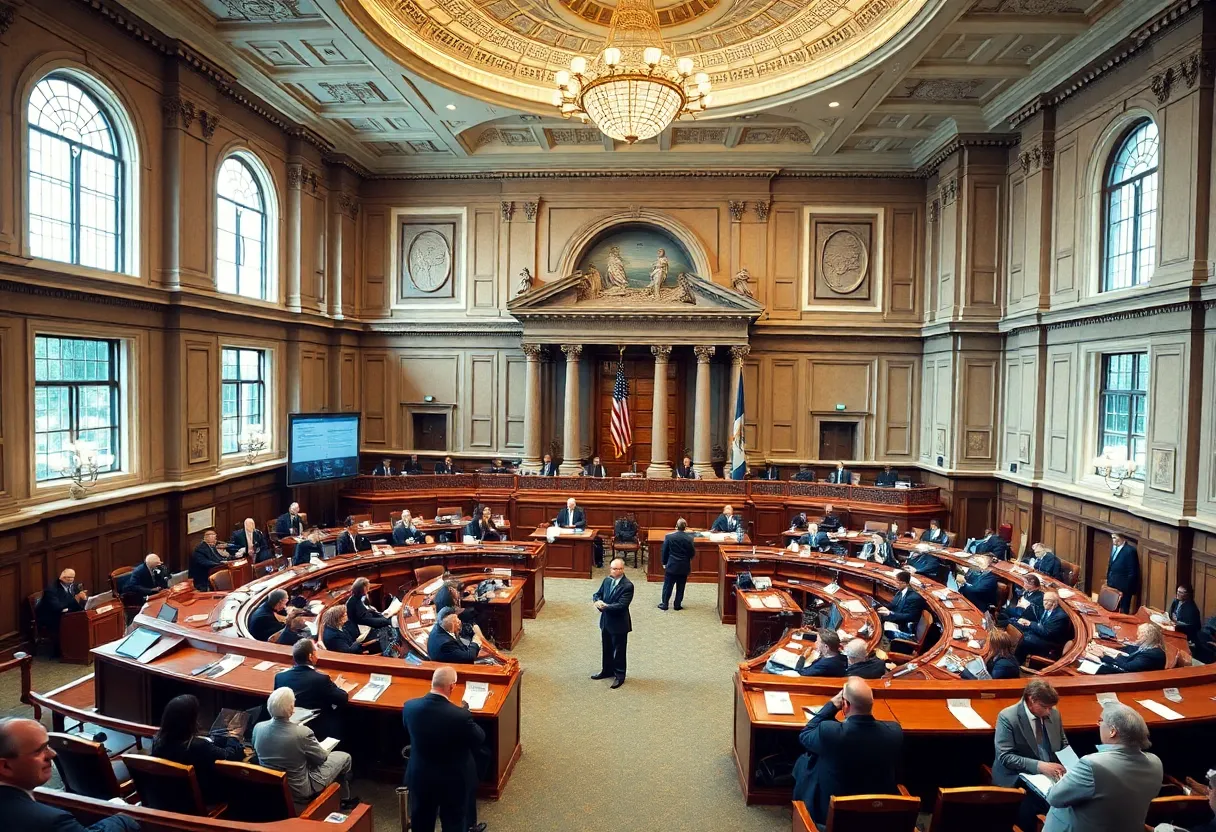News Summary
As Pennsylvania approaches the new fiscal year starting July 1, 2025, lawmakers are working to finalize a $51.5 billion budget. Key proposals include a significant increase in Medicaid funding, legalization of adult-use marijuana, raising the minimum wage, and enhancing education funding. Governor Shapiro’s budget aims to address systemic inequalities but faces opposition, particularly from Republican leaders concerned about financial stability and overreliance on unapproved revenue sources. With only two weeks left for approval, the current budget plan is critical for various sectors, including healthcare and public education.
Pennsylvania lawmakers are racing against the clock to finalize a $51.5 billion state budget ahead of the new fiscal year, which begins on July 1, 2025. With only two weeks remaining for approval, failure to reach a consensus could result in the loss of certain spending authorities.
The proposed budget presents a significant 9% increase in total authorized spending, amounting to approximately $3.8 billion. A notable aspect of this budget is a $230 million increase slated for the current year’s expenses. A substantial portion, estimated at $2.5 billion, is earmarked for Medicaid spending that has risen due to higher numbers of individuals enrolled following the COVID-19 pandemic.
Governor Josh Shapiro’s budget outlines critical proposals including legalizing adult-use marijuana for individuals aged 21 and older, raising the minimum wage to $15 per hour, and implementing a 35% tax rate on “skill” games, which has sparked concerns among local business owners.
Projected tax collections for the upcoming fiscal year are anticipated to increase by $2.3 billion, bringing total tax revenue to roughly $48.3 billion. This estimate is highly dependent on the successful legalization of marijuana and the introduction of new tax measures. Although the House has passed a bill supporting marijuana legalization, it encounters significant pushback from the Republican leadership in the Senate.
In addition to these proposals, Shapiro’s budget focuses on education funding, with an $800 million increase (6%) intended to enhance K-12 and higher education. This funding also addresses a court’s ruling regarding public school financing. Significant savings are projected for public schools, particularly due to reducing reimbursements for cyber charter schools. However, the Senate’s stance remains unclear.
The budget includes transportation funding requests, featuring a 20% increase of $283 million for public transit agencies aimed at revitalizing services post-pandemic. Another proposal looks to accelerate the reduction of the Corporate Net Income Tax (CNIT) to a 4.99% rate by 2029, accompanied by the introduction of the new AdvancePA tax credit, designed to attract high-paying jobs and facilitate tax compliance for small businesses.
Healthcare initiatives are also a priority, particularly for nursing home operators and home-care providers who seek additional funding for Medicaid home care services. Allocations toward local healthcare are vital given the ongoing labor shortages in the sector.
While advocating for various social and economic changes, Shapiro faces criticism for potentially depleting the state’s Rainy Day Fund and for an overreliance on the anticipated revenues from unapproved policies like marijuana legalization. Republicans have voiced concerns regarding the projected budget deficit, arguing that the state’s financial stability might be at risk unless new revenue streams are secured.
Shapiro’s budget also outlines substantial investments in economic development, including $20 million for rejuvenating downtown businesses and additional funds aimed at workforce development. Meanwhile, the governor’s proposals to enhance clean energy initiatives have drawn mixed reactions, particularly regarding their impact on costs for consumers and the existing energy industry in Pennsylvania.
As Pennsylvania heads towards the budgetary deadline, discussions continue around ensuring equitable access to essential services, with strong emphasis placed on improving funding in the education and healthcare sectors to combat systemic inequalities faced by underserved communities.
Deeper Dive: News & Info About This Topic
- Indiana Gazette
- Wikipedia: Pennsylvania State Budget
- NC News Online
- Google Search: Pennsylvania budget 2025
- Go Erie
- Google Scholar: Pennsylvania budget 2025
- Delaware Valley Journal
- Encyclopedia Britannica: State Budget
- Keystone Newsroom
- Google News: Pennsylvania 2025 budget

Author: STAFF HERE PHILADELPHIA WRITER
The PHILADELPHIA STAFF WRITER represents the experienced team at HEREPhiladelphia.com, your go-to source for actionable local news and information in Philadelphia, Philadelphia County, and beyond. Specializing in "news you can use," we cover essential topics like product reviews for personal and business needs, local business directories, politics, real estate trends, neighborhood insights, and state news affecting the area—with deep expertise drawn from years of dedicated reporting and strong community input, including local press releases and business updates. We deliver top reporting on high-value events such as Mummers Parade, Philadelphia Flower Show, and Thanksgiving Day Parade. Our coverage extends to key organizations like the Greater Philadelphia Chamber of Commerce and United Way of Greater Philadelphia, plus leading businesses in telecommunications, food services, and healthcare that power the local economy such as Comcast, Aramark, and Children's Hospital of Philadelphia. As part of the broader HERE network, we provide comprehensive, credible insights into Pennsylvania's dynamic landscape.





